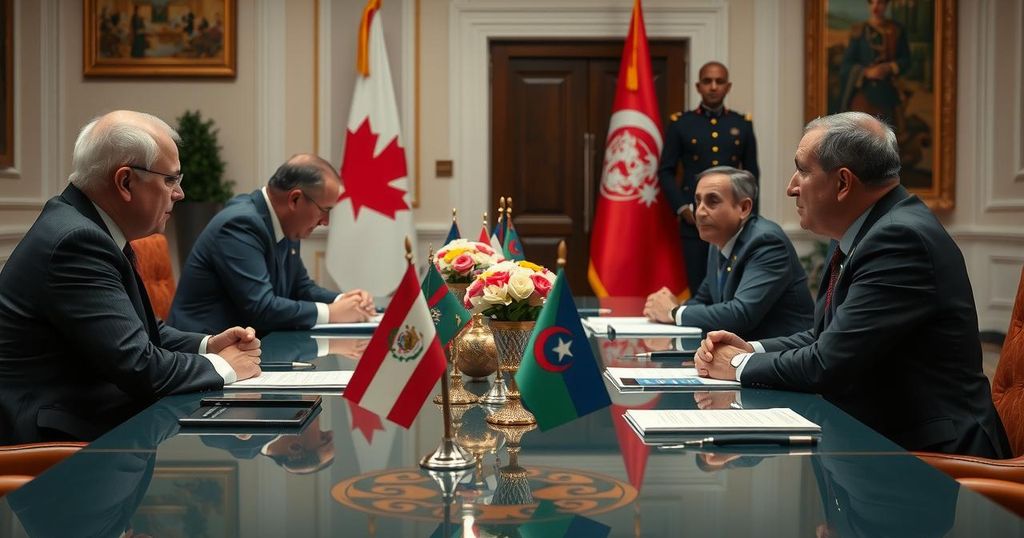King Abdullah II Hosts Sheikh Abdullah bin Zayed at Aqaba Meetings on Syria

King Abdullah II of Jordan met with H.H. Sheikh Abdullah bin Zayed and other officials during the Aqaba meetings focused on Syria. The discussions highlighted the need for a unified international response to stabilize Syria, support an inclusive political transition, and enhance humanitarian assistance for refugees. The meeting underscored the importance of Arab coordination in resolving the Syrian crisis.
On December 14, 2024, His Majesty King Abdullah II bin Al Hussein of the Hashemite Kingdom of Jordan welcomed H.H. Sheikh Abdullah bin Zayed Al Nahyan, the Deputy Prime Minister and Minister of Foreign Affairs of the United Arab Emirates, along with other Arab and foreign ministers, who were present for the Aqaba ministerial meetings focused on the situation in Syria.
During their discussions, H.H. Sheikh Abdullah bin Zayed conveyed the cordial greetings of President His Highness Sheikh Mohamed bin Zayed Al Nahyan, expressing hopes for ongoing prosperity for the Jordanian populace. In reciprocation, King Abdullah extended his warm regards to President Mohamed bin Zayed, wishing further advancement for the UAE and its people.
King Abdullah emphasized that the stabilization of Syria serves as a vital strategic interest for Arab nations and the broader region. He called for a united and effective international response to safeguard Syria’s security, citizens, national institutions, and territorial integrity. He expressed his dedication to supporting a political transition in Syria that is inclusive of all political and social factions, underlining the importance of both the United Nations and the Arab League in facilitating these aspirations.
The King underscored the necessity of unity among Syrians in reconstructing their nation into a secure, free, and stable entity. He also highlighted the urgent need for enhanced cooperation to combat terrorism and address the associated threats to Syria, which, in turn, affects regional stability and global security.
Furthermore, King Abdullah reaffirmed Jordan’s commitment to delivering crucial humanitarian assistance to the Syrian populace. He pointed out the necessity of establishing conducive security, living, and political conditions for the voluntary repatriation of Syrian refugees, in concert with the relevant United Nations organizations.
The meeting encapsulated the critical role of the Aqaba ministerial meetings in bolstering Arab collaboration and coordination with the international community towards achieving a political resolution that fosters Syria’s unity, sovereignty, and the enduring security of its citizens.
The Aqaba ministerial meetings represent a significant diplomatic engagement aimed at addressing the ongoing crisis in Syria, which has profound implications for regional stability and security. These meetings brought together key leaders from the Arab world and beyond to formulate a unified approach to the multifaceted challenges faced by Syria, including political turmoil, humanitarian crises, and the threats posed by terrorism. King Abdullah II of Jordan and Sheikh Abdullah bin Zayed of the UAE are pivotal figures in these discussions, highlighting their nations’ roles in fostering stability and cooperation in the Arab region. The commitment of these nations to a peaceful resolution through effective collaboration with international organizations underlines the urgency of resolving the Syrian issue for the benefit of its citizens and the larger region.
In summary, the discussions held during the Aqaba ministerial meetings reinforced the shared commitment of Arab leaders and international officials towards a stable and unified Syria. King Abdullah II articulated the critical importance of collaboration in addressing Syria’s challenges while emphasizing humanitarian support and the unity of the Syrian people as essential for a peaceful transition. The dialogue signifies a proactive approach to enhance cooperation and ensure lasting stability and security in the region.
Original Source: www.wam.ae








